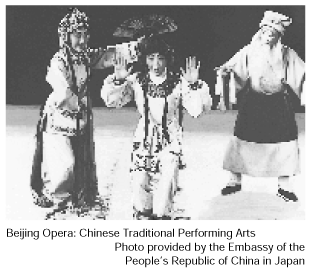| Home > Policy > White Paper, Notice, Announcement > White Paper > Japanese Government Policies in Education, Science, Sports and Culture 2000 > Part 1 Chapter 4 Section 4 2 | ||
The Chinese government has been making efforts to strengthen culture-related legislation since 1980. The Chinese government has enacted the following legislation thus far: the Voice-Image Product (cassette tapes, videos, etc.) Management Ordinance, the Publishing Management Ordinance, the Film Management Ordinance, the Business Performance Management Ordinance, and other such ordinances.
In 1997, the Chinese government initiated a three percent tax throughout the country on various amusement industries, collected as the construction fee for cultural activities. Revenues from this tax are included in the Chinese budget and are used to establish special funds for cultural activities.
The government offers preferential tax treatment for cultural activities. The normal rate of business tax is five percent, while the rate of tax for cultural activities is only three percent. The rate of value-added tax on books, newspapers, and magazines is only thirteen percent, which is lower than the basic rate of seventeen percent. Business taxes on revenues from admission tickets to art galleries and museums as well as fixed property taxes on the purchase and installment of equipments for public cultural facilities are completely exempt from taxation.
In addition, the Chinese government encourages private contributions for public cultural activities and public service cultural activities organized by private companies. Private contributions up to three percent of one's taxable annual income are deductible.
The Chinese government places emphasis on the protection of developing areas and ethnic minority districts, important cultural preserves, and art and cultural organizations with strong provincial or ethnic characteristics. The government makes efforts to establish special funds for this purpose.
Based on the above-mentioned policy and legislation, the Ministry of Culture manages an extensive scope of activities. These activities include formulate projects to promote art and cultural activities and supervise their implementation; research on cultural policies; providing would-be artists with training; administering the construction of culture-related facilities, instructing and managing cultural industries and markets; and developing international cultural exchange programs. In addition, the Ministry of Culture provides guidance to various art and cultural organizations, examines the qualifications of national-level cultural organizations; honors talented artists; maintains libraries; examines, publishes, and approves culture-related materials; and manages performance activities such as films and dramas.
The Ministry of Culture has several institutions and organizations under its direct control. They include the Academy of Arts, the Chinese Academy of Beijing Opera, the Academy of Chinese-style Painting, the Chinese Academy of Music, the Central Academy of Fine Arts, the Central Academy of Ballet Opera, the East Opera Company, the Chinese Symphony Orchestra, and the Central Ethnic Band, as well as various art galleries and publishers.
The Ministry of Culture has special funds for the purpose of protecting art- and culture-related activities. They include the Special Funds for Cultural Development and Diffusion, the Special Funds for Creating and Performing Excellent Works, the Special Funds for National Film Activities Development, and the Special Funds for Publication Development. The revenue sources for these funds come from the national fiscal budget and extra budgetary resources approved by related legislations.
The Chinese government began to implement economic reforms in 1979, dissolving people's communes and guaranteeing private companies and individuals the right to engage in economic activities. In other words, the Chinese government has adopted a capitalist form of economic management within the socialist framework. Due to a series of economic reforms, the Chinese economy has achieved a remarkable rate of development, maintaining annual economic growth of seven to nine percent.
In order to deal with social changes accompanying rapid economic development, the Chinese government began to implement administrative reforms, such as reviewing governmental functions and streamlining the government. Based on this official policy, approximately ten years ago, the Ministry of Culture began to deal with management of cultural markets and the development of cultural industries by establishing the Agency of Cultural Markets and the Agency of Cultural Industry.
More specifically, the Agency of Cultural Markets manages video and CD markets, amusement industry activities such as karaoke and game parlors, films and public service activities, and imports of culture-related goods. The Agency of Cultural Industry implements policies for developing cultural industries, such as plans to promote cultural industries and instructing and managing the establishment of culture-related facilities.

| Back to Top | MEXT HOME |